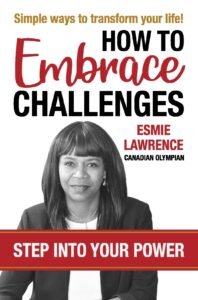Jim Rohn once said, “Take care of your body. It’s the only place you have to live.” A great way to start is to exercise regularly. Exercise is like a feel-good drug. It raises our levels of endorphins, those hormones that give us a high after a workout.
Exercise energizes us. We go to work with sharp minds, and at night we sleep like babies. Also, through exercise, we can either lose weight or maintain it. What’s not to like about exercise? As a former elite athlete, I know its value, and I love the way it makes me feel. When I’m on my game, I integrate the 5 AM Club into my life.
The 5 AM club was a discovery that made a huge difference to me. A Canadian author called Robin Sharma coined the term the 5 AM Club and wrote a book about it. Robin gets up at 5 AM every day because he’s more productive at that time. He calls it winning the battle of the bed or putting mind over mattress. (I’d love to go to one of his motivational conferences!)
Like many creative people, Sharma loves the hour between 5 AM and 6 AM. He encourages readers to get up at five and prepare to be successful in whatever they do. He shot a video about this on the island paradise of Mauritius and walks you through the best ways to get up early and greatly increase your productivity and quality of life. [1]

I was once a disciplined member of the 5 AM Club. Being determined to get into an early exercise routine, I pushed myself to develop good habits. Before going to bed, I would place my workout clothes by my door. I’d put my alarm on the other side of the room so that I am forced to get up and turn off my alarm.
Once out of bed, I was good to go. I said a prayer of gratitude, put on my workout clothes, and went for a run or to the gym. Then I’d shower and feel refreshed for the start of the working day. So what happened? The truth is, I stopped exercising January when I got too busy. Also, I made all kinds of excuses for my failures.
We all know that if we don’t do regular exercise, we have to pay the price, and I was aware that the lack of it would eventually affect my well-being. I am healthy and strong, but as a result of not exercising, I gained about 30 pounds. Being tall, I carried my weight well, but I could feel the difference in my body. You might think I’m too hard on myself, but if I am to get back on track, I need to be brutally honest.

Perhaps you can also relate to my excuses for not exercising. When I heard my alarm in the morning, that cozy bed felt so good. It enticed me to lie in so that I missed the opportunity to go to the gym because there are now more urgent things to do. So I lay in bed until the second alarm—what I call my crisis alarm—went off.
If I didn’t get out of bed now, I would be late for work. So I’d jump out of bed, run to the shower, and go out to earn a living. What was going on here? I was starting each day in crisis mode! Another thing I would do was persuade myself I was too tired. But not working out only made me feel guilty, so I’d spend the rest of the day beating up on myself for my lack of self-discipline.
When I didn’t exercise, it affected my mood. It became harder to be positive. I didn’t feel physically well, either. I felt sluggish, and to make matters worse, I start gaining weight. Before I realized it, the months had slipped by, and I’d put on an extra 30 pounds.
Readers, I’m saying this to myself as well as to you: We’ve got to stop making excuses.
Did you know, Leonardo Da Vinci was 51 years old when he painted the Mona Lisa? Dr. Seuss was 54 years old when he wrote The Cat in the Hat? That Anne Frank was thirteen years old when she began her famous Diary? That J.K. Rowling was 30 years old when she finished the first manuscript of Harry Potter? We can do whatever we put our minds to do.

Have you heard of Ernestine Shepherd, the 81-year-old woman who can bench-press 115 pounds? Ernestine gets up at 2.30AM every day. She says, “After my devotions and meditations, I have breakfast.
Then I go for a run (with a bit of walking thrown in) in my hometown of Baltimore. A typical day sees me usually exercising at the gym by 7.30am. Then I’ll teach a workout class with up to 45 people until around 11.30am before going home to eat, have a nap and see my husband, Colin. I’m usually back at the gym for 5.30pm, training people aged 20 to 86, until 7 PM.” [2] Readers, don’t you feel inspired by Ernestine Shepherd? I certainly do.
You might say, “Esmie, I don’t have a gym membership.” Well, you can still work out.
How to strengthen your resolve (with or without a gym membership)
1. Take the stairs.
In her article, “Six Reasons to take the stairs,” Dr. Yasmine Ali wrote: “Studies have shown that stair climbing, which is considered vigorous-intensity physical activity, burns more calories per minute than jogging. “She goes on to say, “Stair climbing expends eight or nine times more energy than sitting, and about seven times more energy than taking the elevator.
As an added bonus, you burn calories not only on the way up but also while going down the stairs! It is estimated that the average individual will burn at least 0.1 calories for every step she climbs (so, at least 1 calorie for every 10 steps ascended) and 0.05 calories for every step descended (so, 1 calorie for every 20 steps on the way down).” [3]
Dr. Ali also tells us that climbing the stairs strengthens our muscles and reduces our risk for stroke. A stroke occurs when the blood flowing to your brain in suddenly interrupted. See HealthSketch video: What is a Stroke? Animated Explanation Video.[4]

2. Park your vehicle farther away from where you work.
In this way, you are forced to walk a little further because every step counts towards your goal.
3. Make exercise a regular habit.
How long does it take a new habit to form? This can vary widely, depending on the behavior, the person, and the circumstances.” In an article titled, “How Long Does it Actually Take to Form a New Habit?”
James Clear tells us that “on average it takes more than two months before a new behavior becomes automatic — 66 days to be exact.” He adds, “If you want to set your expectations appropriately, the truth is that it will probably take you anywhere from two months to eight months to build a new behavior into your life — not 21 days.”
Interestingly, the researchers also found that “missing one opportunity to perform the behavior did not materially affect the habit formation process.” In other words, it didn’t matter if you messed up every now and then. Building better habits was not an all-or-nothing process.”[5]
So, readers, let’s start exercising regularly and don’t beat ourselves up if we miss a day
4. Become a member of the 5 AM club.
This club will give you the discipline to achieve your dreams.
5. Get a personal trainer or someone who will keep you accountable.
Then you will do what you say you’re going to do, and show up because they’re expecting you.

6. Join a health club, so you are surrounded by people that are working out.
We all do better when surrounded by like-minded people with similar goals. Before you workout, see your health practitioner and get their okay before starting any new exercise program.
I am a member of a beautiful gym that is located about 30 minutes from my home. Each time I went, I saw this beautiful, fit-looking woman working out. I decided to ask her about herself and learned that she never missed a day at the gym, except when she was on vacation. And even then, she found time to work out. She told me the reason she never missed a day was that working out made her feel good. She was such an inspiration.

Okay, friends, let’s not make any more excuses for not exercising. Today let’s reset our goals. Please make a commitment to your health by making exercise a part of your lifestyle? Go to my website: esmielawrence.com and write a comment about how you are going to incorporate exercise into your life.
1. Sharma, R. How to Wake Up Early | Robin Sharma – YouTube. 2019; Available from: https://www.youtube.com/watch?v=-xC_DbgpPAc.
2. Shepherd, E., Meet the 81-year-old woman who can bench press 115lb – BBC Three, in Health & Wellbeing. 2018, BBC THREE.
3. Ali, Y., 6 Reasons You Should Take the Stairs. 2019, Verywell.
4. HealthSketch. What is a Stroke? Animated Explanation Video. 2015; Available from: https://www.youtube.com/watch?v=ryIGnzodxDs&t=3s.
5. Clear, J., How long does it actually take to form a new habit?(Backed by Science). The Huffington Post, 2014. 10.
Author: Esmie Lawrence is an international best selling author, speaker, blogger and podcaster.


